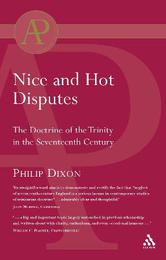
|
Nice and Hot Disputes
Paperback / softback
Main Details
| Title |
Nice and Hot Disputes
|
| Authors and Contributors |
By (author) Dr. Philip Dixon
|
| Physical Properties |
| Format:Paperback / softback | | Pages:252 | | Dimensions(mm): Height 216,Width 138 |
|
| Category/Genre | Christian theology |
|---|
| ISBN/Barcode |
9780567042217
|
| Classifications | Dewey:231.044 |
|---|
| Audience | | General | | Tertiary Education (US: College) | | Professional & Vocational | |
|---|
|
Publishing Details |
| Publisher |
Bloomsbury Publishing PLC
|
| Imprint |
T.& T.Clark Ltd
|
| Publication Date |
9 December 2005 |
| Publication Country |
United Kingdom
|
Description
At the beginning of the seventeenth century the doctrine of the Trinity was still a central theme in Christian Theology. By the end of the century it was fast becoming peripheral. As theologians today increasingly recognize the Trinity to be at the very heart of the Christian theology, the question of 'what went wrong' three hundred years ago is a matte of growing interest. Whereas most studies of the history of tinritarian doctrine neglect the seventeenth century almost entirely, Philip Dixon argues that this is a key period in the history and development of the doctrine and, indeed, essential for contemporary understanding. Drawing on a wide range of primary sources, Dixon examines the Socinian and anti-Socinian writings of the 1640s and 1650s, including Biddle and Cheynell, and their legacy for the disputes of the 1690s; the trinitarian theology of Hobbes and the violent reaction of his critics; the debates from the Restoration to the 1690s, including Milton, Nye, and Bury; the writings of Locke and Stillingfleet; and the continuation and development of these disputes into the early eighteenth century. A final chapter offers some significant conclusions for students of systematic and historical theology alike. In the breadth of its scope and in the importance of the material uncovered, this book makes an unique contribution to the understanding of trinitarian theology and practice.
Author Biography
Dr. Philip Dixon lectures at University of Wales College, Lampeter, and is Academic Tutor at the Maryvale Institute.
Reviews'Its straightforward aim is to demonstrate and rectify the fact that "neglect of seventeenth-century England is a serious lacuna in contemporary studies of trinitarian doctrine" . . . admirably clear and thoughtful.' John Morrill, Cambridge * Blurb from reviewer * ' . . . a big and important topic largely untouched in previous scholarship and written about with clarity, enthusiasm, and even occasional humour . . .' William C. Placher, Crawfordsville * Blurb from reviewer * "Dixon explores the theological (as distinct from the merely historical) significance of the Trinitarian disputes of the period of the Civil War and the Stuart Restoration to determine what these have to teach us about the doctrine itself...Dixon contends powerfully that we cannot appreciate the recovery of Trinitarian theology in the nineteenth and twentieth centuries without understanding those factors that drove the Trinity into the 'lumber room' of theology during the seventeenth and eighteenth...Dixon uses the concept of 'person' to limit his concerns and focus his study through the ocean of books, tracts, pamphlets, replies, replies-to-replies, etc., that make a study of the Trinitarian disputes during this period a daunting undertaking. It is amazing what 'fish' his net catches." Patrick Madigan, Heythrop Journal * Heythrop Journal * 'This interesting, exciting and informative book certainly deserves a wide readership. It beautifully blends together history and theology...his grasp of history is superb' * Irish Theological Quarterly *
|